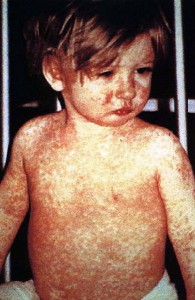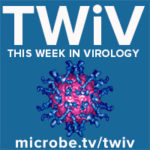 Hosts: Vincent Racaniello and Glenn Rall
Hosts: Vincent Racaniello and Glenn Rall
Vincent and Glenn Rall chat about koi herpesvirus, H1N1 influenza vaccine produced in insect cells, attack by a rabid raccoon, and measles.
Click the arrow above to play, or right-click to download TWiV #38 (63 MB .mp3, 91 minutes)
Subscribe (free): iTunes, RSS, email
Links for this episode:
- Virus suspected in carp die-off: koi herpesvirus
- H1N1 influenza vaccine produced in insect cells with baculovirus vectors
- Outbreak of measles in Wales
- Production of influenza vaccines in cell cultures: MDCK, Vero, PER.C6, EB66, insect (thanks Peter!)
Weekly Science Picks
Glenn Riddled with Life by Marlene Zuk
Vincent All the Virology on the WWW
Send your virology questions and comments to [email protected]


Hi Professor, I am slowly but surely making my way through all the past twivs. I don't want to miss anything! So you and Glenn Rall were talking about how immunosuppression by measles is actually “just” inhibitionn of IL-12. So are people who are immunosuppressed (temporarily) by measles virus just immunosuppressed to viruses or are they also immunsuppressed in regards to bacteria also? Since the measles virus inhibits IL-12, it sounds like then Helper T2 cells are made which would still fight bacteria. I found this episode to be completely fascinating. Which is saying something, because I like all the twivs!
Hi Diane!
Thanks for your interest in the measles TWiV. If I said “just”, that was certainly a mis-statement, since immunosuppression caused by viruses is a complex, and likely multifactorial, process. However, your point is a good one: presumably loss of IL-12 would skew toward a Th2 profile, which you would think would be helpful against bacteria and parasites. But remember that T and B cells are highly specific, so it's likely that the “skewing” only affects the measles specific T cells, not all T cells. Even so, why would MV-infected people be more susceptible to bacteria and parasites? To my knowledge, we don't yet have an answer for this, but as I mentioned, this is a really active field, and a number of other strong hypotheses are being tested that might provide some clues as to how a MV infection might influence the efficiency of the entire host response.
Hi Prof. I have a question about something you said in “Virology-II” at Coursera. You said that measles cause a persistent infection with a life-long immunity. The virus likely resides in the CNS. If this is what you meant to say that’s mean that is “somehow” similar to the HSV. If this was true, we should see (as for HSV) the recurrence of the disease at least in immunocompromised individuals.
Is this observation supported by blood analysis (RNA, protein assays) or is this an evidence coming from post-mortem brain analysis?
Thanks in advance for any clarification on this topic.
Maurizio